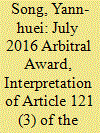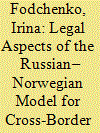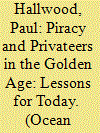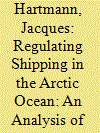| Srl | Item |
| 1 |
ID:
160923


|
|
|
|
|
| Summary/Abstract |
This article discusses the insufficient consideration of the role of state practice in the interpretation and implementation of Article 121(3) of the UNCLOS by the Arbitral Tribunal in the South China Sea Arbitration Case. The article argues that the Tribunal's view on the “threshold” established and its conclusion that there was no evidence that an agreement existed based upon state practice on the interpretation of Article 121(3) are open to question.
|
|
|
|
|
|
|
|
|
|
|
|
|
|
|
|
| 2 |
ID:
160921


|
|
|
|
|
| Summary/Abstract |
In November 2016, the Korea Coast Guard published the “Manual for the Use of Weapons” in response to the sometimes violent resistance of Chinese fishing vessels to the law enforcement activities of the Korea Coast Guard. This article looks at this manual, the possible uses of crew-served weapons, and the international legal precedents for the use of force at sea.
|
|
|
|
|
|
|
|
|
|
|
|
|
|
|
|
| 3 |
ID:
160924


|
|
|
|
|
| Summary/Abstract |
This article examines the provisions in the 2010 Russian–Norwegian Treaty on Maritime Delimitation and Cooperation in the Barents Sea and the Arctic Ocean dealing with the management of transboundary hydrocarbon resources. How compatible is the unitization mechanism in the Treaty with Russian and Norwegian legislation? Will there be tension between Russian and Norwegian interpretations? How does Russian and Norwegian legislation support or challenge the concept of a “unit operator” in a cross-border unitization? What are the possible concerns and pitfalls related to mechanisms for consultations and procedures for dispute resolution?
|
|
|
|
|
|
|
|
|
|
|
|
|
|
|
|
| 4 |
ID:
160919


|
|
|
| 5 |
ID:
160922


|
|
|
|
|
| Summary/Abstract |
Customary international law has governed high seas piracy for many centuries and is now codified in the United Nations Convention on the Law of the Sea (LOSC). In this article, we discuss the reasons why enforcement against piracy today is less effective than three hundred years ago. We contend that crime, including the crime of piracy, can be modeled as a rational choice that is responsive to expected rewards and punishments. Based on this view, we argue that three hundred years ago, the free rider problem resulting from enforcement on the high seas was less prevalent than it is today because seaborne trade was more concentrated in the vessels of a few countries, making enforcement more like internal than international policing. The persistence of piracy today also stems from a continuing low probability of capture coupled with lenient punishments. In addition to enforcement differences, we contrast the sources of piracy in the two eras—in the earlier period, the end of privateering led many privateers to engage in piracy, whereas today, the main source of pirates in the Western Indian Ocean is the existence of a “failed state,” and off West Africa and South East Asia pirates are common criminals.
|
|
|
|
|
|
|
|
|
|
|
|
|
|
|
|
| 6 |
ID:
160925


|
|
|
|
|
| Summary/Abstract |
The United Nations Convention on the Law of the Sea (LOSC) permits state parties to establish an Exclusive Economic Zone (EEZ) 200 nautical miles from their coast. Coastal states have exclusive jurisdiction over resources within the EEZ, but navigational and other high seas freedoms continue to exist. A significant number of states have, however, enacted legislation that departs from the LOSC, interfering with the navigational rights and freedoms of other states. This article analzses this development with a specific focus on the Arctic. It investigates the powers of Arctic coastal states to regulate shipping in the EEZ and thereby navigation in the Arctic Ocean. It adds to the existing literature by providing an analysis of state practice, suggesting that despite uncertainty concerning the interpretation of the LOSC Article 234 and the right to exercise legislative jurisdiction over ice-covered waters, a not insignificant number of states have claimed jurisdiction in their own EEZ beyond the rights granted in the LOSC, and are therefore not in a position to object to extensive jurisdictional claims in the Arctic.
|
|
|
|
|
|
|
|
|
|
|
|
|
|
|
|
| 7 |
ID:
160920


|
|
|
|
|
| Summary/Abstract |
The Timor Sea Conciliation is the first experience with the compulsory conciliation under Annex V of the 1982 United Nations Convention on the Law of the Sea. The Conciliation Commission addressed the objections to its competence as a preliminary matter and rendered a separate decision. This article examines the approach of the Conciliation Commission in dealing with its competence issues and the understandings of the Conciliation Commission as regards the relevant provisions of the 1982 Convention.
|
|
|
|
|
|
|
|
|
|
|
|
|
|
|
|